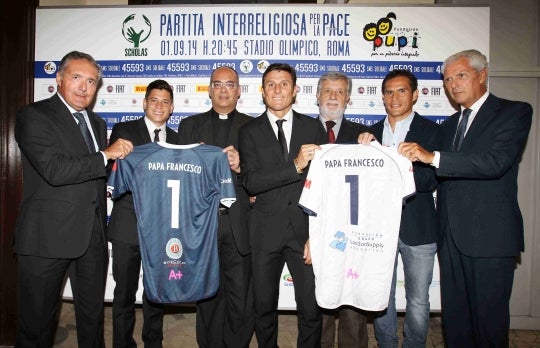
Credit: Match for Peace
On Sept. 1, leading football stars from multiple faiths will come together to play in a watershed Interreligious Match for Peace, supported by Connect4Climate of the World Bank Group.
At its best, sport possesses the power to bring out the best of the human spirit, particularly in moments when athletes display remarkable teamwork and sportsmanship. By affirming shared aspirations, religion and sport share the profound capacity to bring people together across the boundaries of race, nationality, income, and more.
Unfortunately both, sport and religion can also serve as a wedge that divides, particularly when they are misused or abused for ideological purposes. The Interreligious Match for Peace represents a pivotal opportunity to harness the inspirational and bridge-building power of sport and religion. Connect4Climate’s initiative #Sport4Climate is paving the way for the world of sport to take on the climate challenge, while aligning itself with the goals of ending extreme poverty and promoting shared prosperity.
In my role as the lead of the Faith-Based Initiative at the World Bank Group, I have the privilege of engaging with many hopeful and transformational examples of interreligious cooperation to fight poverty, build peace, and protect the environment. Interreligious cooperation and dialogue has played an instrumental role in peacebuilding efforts across the world, evidenced most recently by the courageous leadership of Muslim and Christian leaders working to stem violence and foster reconciliation in the Central African Republic.
Organizations such as Religions for Peace and the World Parliament of Religions have a long track record of building interreligious cooperation to foster peace and tackle many of the most vexing challenges facing the world. Interreligious efforts are also increasingly addressing the looming crisis of climate change, which threatens our collective future. Just prior to the upcoming UN Climate Summit, the World Council of Churches and Religions for Peace are hosting an Interfaith Summit on Climate Change that promises to further galvanize religious communities.
I have been a longtime student of social movements and have admired the ways in which the most successful movements have been inspired and fueled by faith. Interreligious action played a key role in galvanizing the global divestment campaign that helped to dismantle the system of apartheid, and more recently inspired and drove the Jubilee campaign for debt cancellation. These and other movements demonstrate the power of religious cooperation and action.
I hope that spectators and participants in the upcoming Interreligious Match for Peace will treasure a remarkable sporting event and use the occasion to renew and redouble their commitment to promoting peace through tangible acts of pragmatic solidarity to foster peace in our increasingly interdependent world. As Martin Luther King Jr. so poetically reminds us, “injustice anywhere is a threat to justice everywhere.”
I first learned about the concept of pragmatic solidarity during my first visit to Zamni Lasante, a clinic in the central plateau of Haiti operated by the organization Partners in Health (PIH). PIH was cofounded by Paul Farmer and Jim Yong Kim, now president of the World Bank Group. PIH has been running this oasis of access to health in one of the most remote and impoverished corners of the northern hemisphere for decades, based on a commitment to pragmatic solidarity.
Pragmatic solidarity is both the desire to make common cause with those in need and offering goods and services that might diminish undue hardship. Pragmatic solidarity is rooted in one of the core tenets of Catholic social teaching, which calls on us to show a preferential concern or option for the poor and vulnerable among us. This special concern extends not just to our immediate neighbors but also to our global neighbors. Pragmatic solidarity sows seeds of peace and can help turn perceived foes into friends. Through his humble actions of compassion and prophetic calls for greater inclusion and justice, Pope Francis has given new life and meaning to what it means to exhibit pragmatic solidarity.
The great news is that there’s a growing convergence in goals and aspirations between religious leaders and global institutions. The World Bank and the United Nations are working more collaboratively to promote peace and fight poverty based on both the evidence and conviction that there can’t be sustainable peace without inclusive development and that inclusive development is impossible without lasting peace.
The World Bank also recently set dual goals of ending extreme poverty by the year 2030 and boosting shared prosperity around the world. Achieving these ambitious goals will require the ripple and multiplying effect of both small and large acts of pragmatic solidarity, whether that is through giving of time and resources to worthy charitable causes or using your voice and influence to generate greater political and social will to fight poverty and promote peace. The growing challenge of global climate change poses one of the most critical tests to our commitment to pragmatic solidarity since combatting climate change will require shared sacrifice and leadership. Enjoy the match — follow it at #MatchForPeace and #Sport4Climate.


Join the Conversation